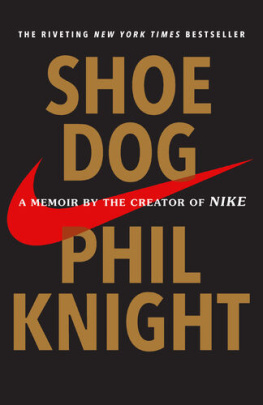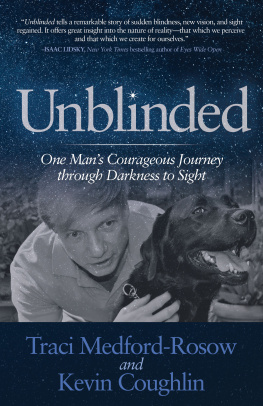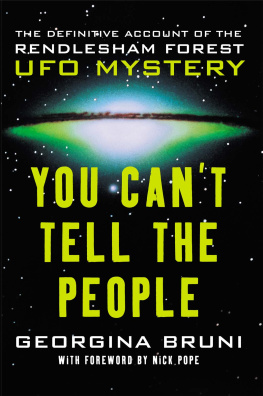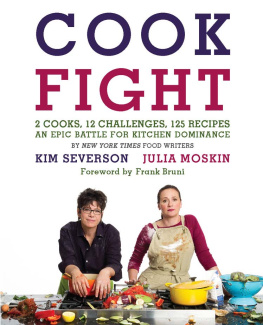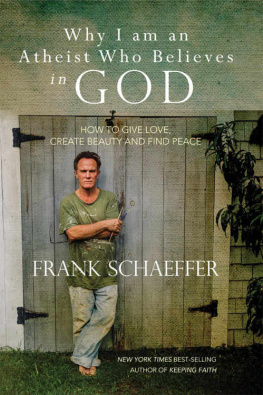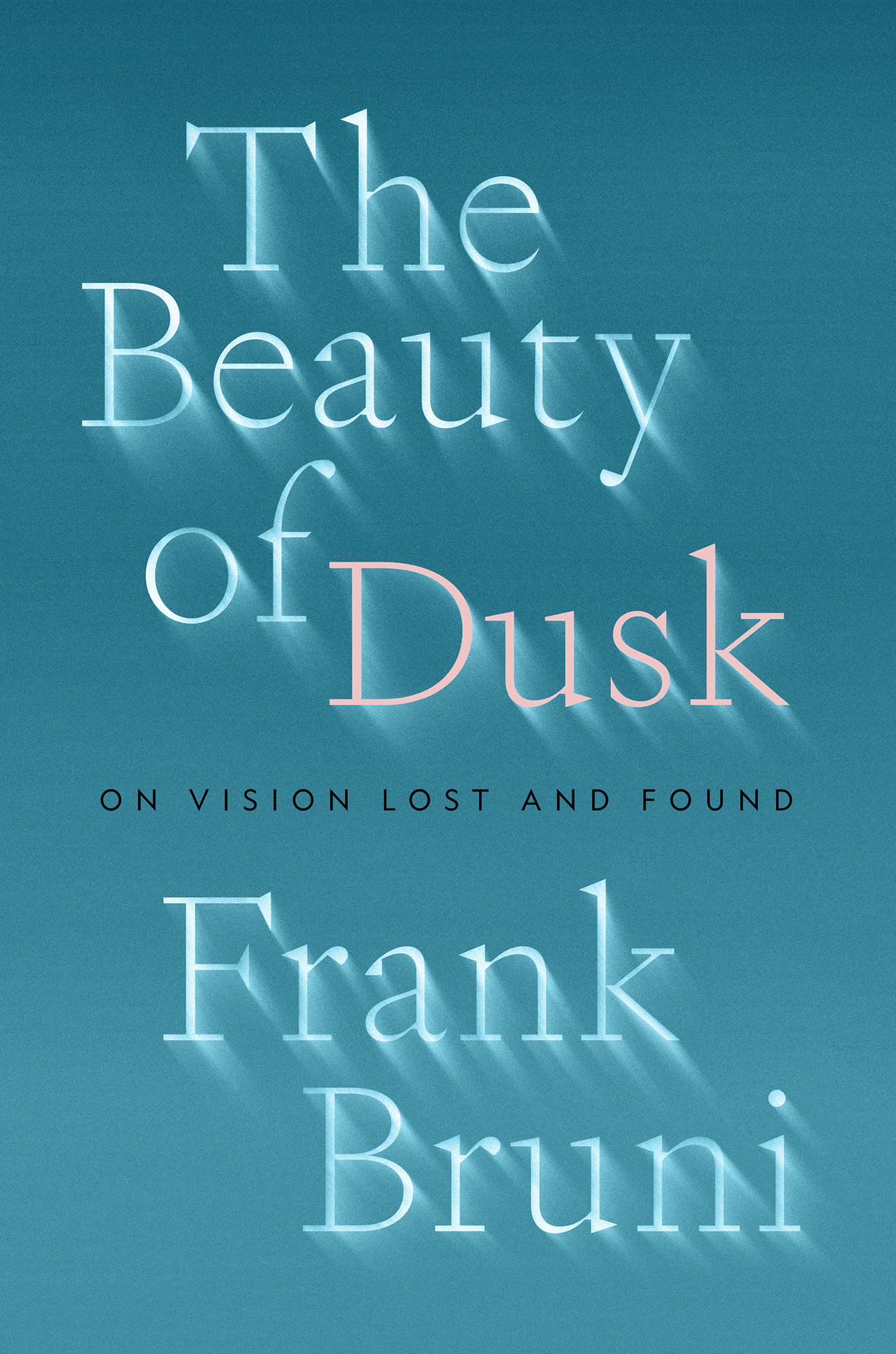Contents
Guide
The Beauty of Dusk
On Vision Lost and Found
Frank Bruni
A VID R EADER P RESS
An Imprint of Simon & Schuster, Inc.
1230 Avenue of the Americas
New York, NY 10020
www.SimonandSchuster.com
Copyright 2022 by Frank Bruni
All rights reserved, including the right to reproduce this book or portions thereof in any form whatsoever. For information, address Avid Reader Press Subsidiary Rights Department, 1230 Avenue of the Americas, New York, NY 10020.
First Avid Reader Press hardcover edition March 2022
AVID READER PRESS and colophon are trademarks of Simon & Schuster, Inc.
For information about special discounts for bulk purchases, please contact Simon & Schuster Special Sales at 1-866-506-1949 or .
The Simon & Schuster Speakers Bureau can bring authors to your live event. For more information or to book an event, contact the Simon & Schuster Speakers Bureau at 1-866-248-3049 or visit our website at www.simonspeakers.com.
Interior design by Lexy Alemao
Jacket design by Evan Gaffney
Author photo Duke University Sanford School of Public Policy
Library of Congress Cataloging-in-Publication Data has been applied for.
ISBN 978-1-9821-0857-1
ISBN 978-1-9821-0859-5 (ebook)
To Leslie Jane Frier Bruni, 19351996.
You remain so very, very near.
Authors Note
Some of the details and language in this book appeared previously in columns and newsletters that I wrote for the New York Times. Some quotations are reproduced not from formal interviews but from incidental conversations, recounted to the best of my memory.
Chapter One THIS IS BAD
They say that death comes like a thief in the night. Lesser vandals have the same MO. The affliction that stole my vision, or at least a big chunk of it, did so as I slept. I went to bed seeing the world one way. I woke up seeing it another.
I went to bed believing that I was more or less in control of my lifethat the unfinished business, unrealized dreams and other disappointments were essentially failures of industry and imagination and could probably be redeemed with a fierce enough effort. I woke up to the realization of how ludicrous that was.
I went to bed with more grievances than I could count. I woke up with more gratitude than I can measure. My story is one of loss. Its also one of gain.
It begins in a bumbling fashion, with a baffled protagonist. That first morning, a Saturday, I struggled to figure out what had happened to me. I wasnt sure that anything of significance had happened at all. Several hours would pass before I grew even remotely worried, before curiosity curdled into a vague, tentative concern.
I got out of bed sluggishly, my head full of lead. Bad Frank. Sloppy, undisciplined Frank. On Friday night, Id had four generous glasses of wine with dinner when two would have sufficed. That had left me with a bit of a hangover, slowing down every part of me: my thoughts, my steps from the bedroom to the kitchen of my apartment on the Upper West Side of Manhattan, my gestures as I went about making coffee. Coffee. Thats what I needed. Caffeine would surely jolt everything into working order. It would snap everything into place.
When I poured boiling water from a teakettle into a French press, my aim was off; I watched a puddle spread across the counter. Huh. How did that happen? I chalked it up not to a visual miscalculation but to carelessness, and while I was aware of a slightly hazy, swimmy quality to the space around me, I attributed that to the wine, and to what must have been fitful sleep, and to a week that had been more frantic than usual, and to the vagaries of energy and concentration. I was just dragging. This might be one of those days when I needed three or even four mugs of coffee, a brisk run, a cool shower. Id shift into gear at some point.
There was work to do. I had more than ninety minutes of audio to transcribe from a conversation that Id had days earlier with George W. Bushs twin daughters, Barbara and Jenna, whose joint memoir, Sisters First, was about to be published. Theyd granted me one of their first interviews about it, in part because Id once written a column for the New York Times about the importance of siblings and it had touched them. Barbara had told me in an email that it was a small part of what prompted their book. Transcribing the interview wouldnt require any particular mental sharpnessit was a rote exercise, a matter of keystrokes, tedium and timeso I figured that it was the perfect chore for my languid state. I sat down at my computer, created a new file and began. And then, only a minute or two later, I stopped.
Why was I having to try so hard to make out the words on the screen? What explained the dappled fog over some of them? I took off my eyeglasses, reached for some tissue and wiped the lenses clean. I never did that often enough, and that was surely the causesome random grease, some vagabond grime.
Back to the audio. Back to the typing. But the fog wouldnt lift, and I noticed now that it was heavier toward the right than toward the left. Also, the words occasionally shimmied. Or did they pulse? I couldnt describe it, not even to myself: It was at once subtle and unsubtle and so very, very weird. I doubted what I was seeingor, rather, not seeing.
I cleaned my eyeglasses again, this time with a soft piece of cloth. I used another soft piece of cloth for the computer screen. The problem didnt go away.
Apparently, the grimethe gunkwas in my eyes, or at least my right eye, which I determined from shutting one eye and then the other, testing each independently. And it was probably just some phlegmy residue from the night, some goo that I could splash away or flush out with water. I muddled through another hour of transcription, marveling at how the lines of type seemed to be tilted instead of neatly horizontal, then I hopped into the shower and turned my face toward the spray.
That, too, didnt work. Nor did the four-mile run through Riverside Park after it, nor the shower after that, and while I know this may be difficult to believe, what I did next wasnt panic or call a doctor or even mention this strangeness with my vision to my longtime romantic partner, Tom, who lived with me and just so happened to be a doctor himself.
What I did nextas I got ready for a dinner party at a friends apartment, as Tom and I took a cab to get there, as we ate and drank and laughed high above Park Avenue, the lights of Manhattan twinkling around uswas lean on my left eye and put my curious situation as far out of mind as possible. That twinkling was actually prettier than ever because those lights wobbled, just as the words on my computer screen had. I chose to be enchanted. I beat back any inklings of alarm.
I said that my story is one of loss and gain. Its also one of faith, or of different, sequential faiths, beginning with my arrogant, unwarranted and since-abandoned conviction that everything was ultimately fixable, that humans of my place and time had devised ways to transcend the maladies and petty indignitiesfrom soaring blood pressure to sagging jowlsthat less invincible humans of less fortunate eras hadnt. Im a boomer, born in the last of the qualifying years (1946 to 1964), and thus the inheritor of a brand of overconfidence and a kind of defiance that dont make adequate allowances for the wages of aging and inevitability of affliction.

